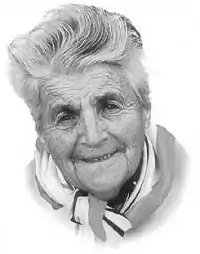Émilie Carles
Émilie Carles (29 May 1900 – 29 July 1979) was a French writer and activist.
Émilie Carles | |
|---|---|
 | |
| Born | Marie Julie Émilie Allais 29 May 1900 Val-des-Prés |
| Died | 29 July 1979 Val-des-Prés |
| Occupation | Teacher and writer |
| Nationality | French |
Biography
Marie Julie Émilie Allais was born in Val-des-Prés on 29 May 1900.[1] Her parents were small farmers in a mountainous region. Her mother died when she was just four. Two of her brothers fought in the First World War. She became a pacifist as a result of their experiences. Carles was educated in a local school but travelled to Paris to complete her teaching diploma when she was sixteen. She returned home were she taught in various schools in the area.[2][3][4][5][6]
in 1927 she met Jean Carles who became her husband. They were pacifists and feminists. The couple had two sons and a daughter. In 1936 they transformed their home in Val-des-Prés into a holiday inn for workers from the city. Their income continued to be supported by Carles' teaching salary. They experienced a tragedy during the Second World War when their daughter was killed in a pedestrian traffic accident with a military truck. Though Jean Carles was entitled to a military pension as a veteran of World War I, he refused it and refused to fight in the Second World War. To avoid being arrested as a deserter, he spent most of the war in hiding. He died in 1962.[3][4][5][6]
Carles wrote an autobiography which detailed her life. The book became a huge success selling millions of copies and being translated into numerous languages. It was made into a TV movie in 1997. When she died on 29 July 1979 Carles donated her body to science.[2][7][3][4][5][6]
Protection of the Vallée de la Clarée
During the 1970s Carles discovered there were plans to build a highway through the Vallée de la Clarée. Believing the road would cause irreparable damage to the environment and the valley she launched a campaign to get the valley protected. Posters, leaflets, petitions and hearings took place. She led a demonstration on 13 August 1974 to Briançon which included 13 tractors and about 300 people at the height of harvest season. In October 1975 there was a press conference in Paris. By 1976, the highway project was abandoned. In July 1992 the valley was reclassified to protect it from future projects.[8][3][4][5][6]
References
- "matchID - Moteur de recherche des décès". deces.matchid.io.
- "Émilie Carles (1900-1979)". data.bnf.fr.
- "Le 29 juillet 1979, Émilie Carles quitte la Vallée de la Clarée". rebellyon.info (in French).
- "Bellaciao - France". BELLACIAO - FR (in French).
- "Vidéos : Vue Liste : Recherche Emilie Carles". Sudorama, mémoires du Sud de 1940 à nos jours (in French).
- "La feuille Charbinoise » Trente ans qu'Emilie ne fait plus bouillir " la soupe "".
- "Emilie Carles". PenguinRandomhouse.com. Penguin Random House.
- Chomette, Pierre (16 August 2020). "Mountains at Work. The Geopolitics of Refuge in the Clarée Valley". Journal of Alpine Research. Revue de géographie alpine. doi:10.4000/rga.7172.